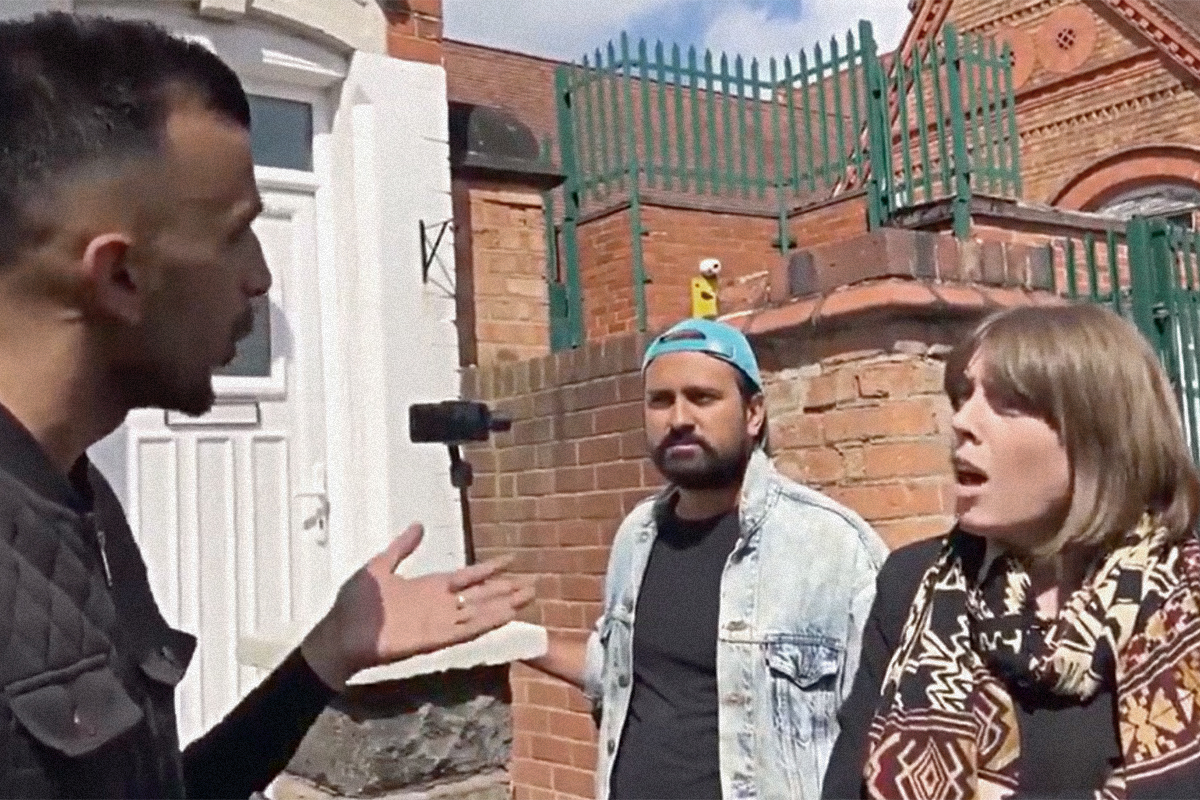Education
When Protected Characteristics Collide
Local MPs have also become involved, some of whom have failed to appreciate the dynamics of the situation.

This weekend, the city of Birmingham hosted a dazzling array of colourful floats, sparkling costumes, and groups bearing a message of love and equality as part of its annual celebration of Gay Pride. However, in an unprecedented move, this particular march was led by LGBT Muslims. Often subjected to discrimination and ostracisation by their own religious communities, and shunned by certain sections of wider LGBT communities for adhering to any form of religion, LGBT Muslims are in a bind. Some people even maintain that the term is an oxymoron. Yet it is precisely young Muslims—who might be experiencing profound questions about their sexuality or identity, and torn between two different sets of expectations—who have the most to lose as a result of the LGBT schools row engulfing the city.
It was therefore encouraging to see them front Gay Pride this year, alongside someone who has done more for equality and diversity than 99 percent of the UK population: Andrew Moffat, Assistant Headteacher of Parkfield Community School. In 2017, Moffatt was awarded an MBE, and subsequently shortlisted for the 2018 Varkey Foundation Global Teacher Prize, for introducing the pioneering “No Outsiders” programme to the school in 2015. Under this scheme, children are taught to welcome all people, regardless of race, disability, sexuality, or gender identity. Moffat taught this lesson in tolerance with the use of story books: one was about two princes getting married, another starred a boy who wanted to wear a dress, and another featured children who were wheelchair users. As far back as 2014, Moffat was getting pushback for the LGBT-inclusive part of this initiative. He was forced to resign from a different Birmingham primary school, the Chilwell Croft Academy, after Christian and Muslim parents complained they did not want their children to learn that “it’s okay to be gay.”
Once he transferred to Parkfield Community School—at which 99 percent of the pupils are Muslim—the No Outsiders programme seemed to get a more positive reception, at least for a while. Moffat deftly responded to parents’ concerns by carefully explaining the provisions of the 2010 Equality Act, and pointing out that it benefited several different minority groups in the UK, including Muslims. In the words of the Equality and Human Rights Commission, “The Act simplifies, strengthens, and harmonises the current legislation to provide Britain with a new discrimination law which protects individuals from unfair treatment and promotes a fair and more equal society.” Situating minority rights in the context of a broader civil rights framework, and doing so in small group discussions, initially paid off. As one Muslim parent remarked, “It’s just about people who are different. It’s about respect.”
Predictably, many children responded with curiosity, followed by insouciance. In a 2016 interview with the Independent, Moffat recalled an exchange with a nine-year-old pupil at Parkfield School: “Is it true you’re gay, sir?” the pupil had asked, while walking back from a Christmas celebration at a local church. Before Moffat could reply, the pupil added, “It’s okay if you are. Because there are no outsiders at our school!” Moffat affirmed that he is gay. The child simply nodded and then asked whether his class had PE that afternoon.
Fast forward to February 2019, when weekly protests staged by an organised group of Muslim parents and a 400-strong petition have halted this award-winning equality programme. In a move designed to cause maximum disruption, 600 children, aged between four and 11, were withdrawn from classes for the day on March 1. Moffat himself was threatened and targeted via a leafleting campaign, and the school was harried into making concessions. Despite enjoying the full support of Amanda Spielman of the Office for Standards in Education, Children’s Services and Skills (OFSTED), the school confirmed that No Outsiders lessons would only resume after Easter, following a full consultation with parents.

Consultation is a thorny area which has also affected a neighbouring primary school, Anderton Park. This school closed early for half-term due to protests from 200 people, during which parents crossing picket lines were subjected to the refrain: “If you take your kids to school today, you’re not a Muslim and will burn in hell.” LGBT campaigners were pelted with eggs for tying rainbow ribbons and messages of love and tolerance to the school gates. All of this was triggered by the Government’s recent consultation over their new relationships education guidance for schools. True to form, religious activists flocked to the issue with an alarming zeal that seems to be reserved for issues relating to sex, relationships, and girls’ dress codes. During an interview I conducted as part of my research into mental health and radicalisation, another primary school headteacher confirmed that few Muslim parents turn up to parent-teacher meetings to discuss other educational issues. But when the permissibility of religious clothing in school was under discussion, the assembly hall is packed to the rafters.
In a recent interview with the Guardian, Anderton Park Headteacher Sarah Hewitt-Clarkson expressed her concern that consultations with parents would only inflame the situation. She worries that parents understand the process as code for “We get to tell headteachers what to do,” and will use their status as an organised religious lobbying bloc to undermine the school and its curriculum. But if they think they will railroad the school into dropping its commitments under the Equality Act, they are mistaken. Hewitt-Clarkson understands the dangers of appeasing religious fundamentalists: “We can’t give in.”
Local MPs have also become involved, some of whom have failed to appreciate the dynamics of the situation. Birmingham Ladywood MP Shabana Mahmood said the Government should ensure that the rights of minorities are protected, but that includes the rights of people with orthodox religious views, including Jews and Christians. Perhaps surprisingly for an MP who voted for same-sex marriage, Mahmood accepts the fallacious arguments of some of the protesters. During a recent Commons debate, she announced: “It is all about the age appropriateness of conversations with young children in the context of religious backgrounds.”
Of course, religion is also a protected characteristic under the Equality Act, but case law shows us that where two protected characteristics collide—and it is usually religion and sexual orientation—religion is usually defeated. This is because, in many of those cases, religious doctrines are invoked as an excuse to discriminate against others. These conflicts between different characteristics, or equality considerations, were a recurring theme of my work at the Equality and Human Rights Commission over ten years ago.
Mrs Naeem, one of the Anderton Park parents, told the Guardian she would not be protesting if teachers at Anderton Park had waited until pupils were 10 or 11 before teaching about LGBT families. In the meantime, she thought it sufficient for children to turn to their parents for information. This is a flawed approach, for several reasons. At primary school age, some children will come from families with gay parents or (more rarely) will have a relative who is transitioning. They might be experiencing crushes on the same sex themselves. Homophobic and transphobic bullying can start very early in a school environment and attention should be paid to prevention as well as cure. Schools are required by the Public Sector Equality Duty to not only address discriminatory incidents as they arise, but to proactively foster good relations between people who have a protected characteristic and those who don’t. The kind of parents who think it is acceptable to disrupt their children’s education due to their personal religious beliefs, who threaten fellow parents with religious sanction for stepping out of line, and who believe that gayness is something that can be “fixed” with prayer, will not create a supportive environment for young people who might be struggling with these issues.
This is a crucial point that another Birmingham MP, Jess Phillips, appreciates. She visited Anderton Park last Monday and clashed with protestors. “What [the protesters] seem to want to do is unravel equalities legislation in their image. They have got to understand that equalities legislation protects them, and you can’t pick and choose.”
Phillips also understands that these protests could be replicated all over the UK, should they be appeased. “If we give in, this is the beginning of something, not the end. If we give in…”—here, she paused, before echoing Sarah Hewitt-Clarkson—“We cannot give in.” However, Phillips was quite wrong to say that the worst thing about this ugly fiasco is the poor reputation it gives Muslims; the worst thing about this fiasco is the impact it has on LGBT people, especially LGBT Muslims.
“There is no place for protests outside school gates,” said the education secretary Damian Hinds recently in response to the ongoing row. “They can frighten children, intimidate staff and parents and, in the worst cases, be hijacked by individuals with a vested interest and no links to the schools. It is time for these protests to stop.” It is noteworthy that the main ringleader of the Anderton Park protests, Shakeel Afsar, only has a niece and nephew at the school, and that his own children attend a different school. Preachers from as far away as Yorkshire have turned up outside the school gates with megaphones.
This has chilling echoes of the campaign against Headteacher Neena Lall at St Stephen’s School, which was ranked the UK’s best state primary school by the Sunday Times in 2017. In September 2017, Lall held a meeting with parents to inform them of a restriction on headscarves for girls under the age of eight. The petition which sought to overturn the ban attracted signatures from all over the UK, not just the school’s catchment area in Newham, and Whatsapp groups were used to drum up additional support.
Which brings me to another disturbing subtext of religious fundamentalist activism: many of these protests are staged by groups of men against female headteachers who have received inadequate support. As Sarah Hewitt-Clarkson told the Guardian: “I know one of the phrases that’s associated with domestic abuse is the crushing of the spirit of a woman. And that’s what I feel is happening.”
These patterns of intimidation and mass withdrawal are not new. As far back as 2010, I was writing about Muslim pupils being withdrawn from music lessons, which have no bearing on the Equality Act. Two things are now crucial: the Department for Education must issue clear guidance, rather than the guidance they issued in February 2019, which had “no specific requirement” for primary schools to cover LGBT content. Second, they must actively support headteachers during these conflicts instead of letting them flounder.






